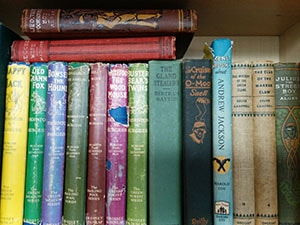 So you like to save money, support local businesses, and be eco-friendly by buying used books from thrift stores and garage sales? Awesome! (Find out more great ways to get books free and cheap.) But now you’ve got mildewy, smoke-stanky, or water-damaged books? Definitely NOT awesome! Don’t worry, you have a few options to try before giving up on your smelly books. Try these steps to neutralize mildew and odors without spending a ton of money.
So you like to save money, support local businesses, and be eco-friendly by buying used books from thrift stores and garage sales? Awesome! (Find out more great ways to get books free and cheap.) But now you’ve got mildewy, smoke-stanky, or water-damaged books? Definitely NOT awesome! Don’t worry, you have a few options to try before giving up on your smelly books. Try these steps to neutralize mildew and odors without spending a ton of money.
1. Dry it off. If your book is actually damp or wet, you’ll first want to make sure it’s thoroughly dry to stop any mold or mildew from forming. Stand the book upright on a table or counter, and gently fan out the pages so they’re not stuck together, using a nail file or letter opener to separate the pages if needed. Let the book stand upright until it’s fully dry.
2. The chamber of kitty litter. For this, you’ll need two plastic containers; the smaller one should fit inside the bigger one, and the bigger one should have an airtight lid. Put your smelly book in the smaller container, then pour a layer of kitty litter into the larger container and place the smaller container inside it. Close the lid on the larger container and get ready to wait — this method can take up to a month. (Charcoal or baking soda also works.)
3. Magic smell-gobbling volcano rocks. No, really! Zeolites are porous volcanic rocks that are natural odor-eaters. You can find them sold as “odor eliminators” and they’re supposedly reusable for years. Like the kitty-litter method, throw the rocks in a garbage bag or airtight plastic container with your smelly books and let them do their magic; you should notice improvements within a few days. Another unexpected but obvious-in-hindsight product that people have had luck with: athlete’s foot spray. (It kills fungi and mold, right?)
4. Cover it up. If all else fails and you really need that book for some reason, you can try to mask the offensive odor as a last resort. Cut fabric softener sheets in half and place them between the pages of your book about every 25 pages. Put the book in a ziploc bag and leave it sealed for several days. Warning: don’t do this on a valuable or antique book, as the chemicals may damage the paper.
5. Prevent future damage. The ideal spot for books is a cool, dry area with low humidity. Avoid storing your books in cool, damp basements, or placing your bookshelves against damp or moldy walls. Be careful of heat, too — storing books in airtight plastic containers and leaving them in direct sunlight can lead to humidity and condensation. If you tend to cram your books tightly on the shelf, leave some space for breathing room. And if you do need to store your books in plastic containers, those silica gel packets that always come in shoes and handbags can help suck up moisture, so hang on to them!
- Spring 2020 Book Preview - May 15, 2020
- Winter 2020 Book Preview - January 1, 2020
- Fall 2019 Book Preview - September 26, 2019

Leave A Comment